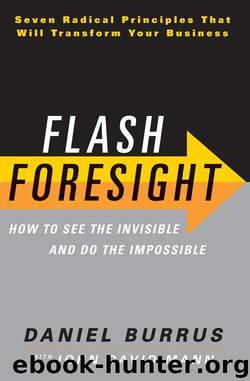Flash Foresight: See the Invisible to Do the Impossible by Burrus Daniel & John David Mann

Author:Burrus, Daniel & John David Mann [Burrus, Daniel]
Language: eng
Format: mobi
Publisher: HarperCollins e-books
Published: 2011-01-17T16:00:00+00:00
This epic shift was a long time coming. For thousands of years, we have imagined what life in an abundant economy would look like, and introduced ideas and mechanisms into our social contract to try to realize such a world, at least inasmuch as possible. From the ancient Greek idea of democracy and revolutionary concept of citizen rights in Rome to the Magna Carta, the American Constitution, the abolition of slavery, and women’s suffrage—each innovation that advanced the cause of individual freedom served as a foretaste of an economy of abundance. But throughout these past ages we still operated within a world of physical scarcity, and therefore a prevailing mind-set of scarcity. However, since the mid-twentieth century, for the first time in history, our advancing technology has allowed us to create a world increasingly circumscribed by abundance rather than scarcity.
The baby boom is the first generation that has grown up in a world where the expectation is that our physical needs will be more than taken care of. Their parents, the World War II generation, grew up with the mind-set that by working hard, it was possible to get ahead and provide for your family. The boomer mind-set was that it was possible for everyone to have plenty, not just those special few who worked extra hard, a mind-set that sees abundance as normal for all, not a hard-won prize for the few. This worldview was at the root of the idealism of the 1960s.
Yet even for the boomers, this sense was mixed, and that lingering sense of scarcity passed down from parents who recalled the Great Depression and World War II was still strong. Not for today’s formative generation. Generation Y, sometimes called the Millennials (or the Echo Boom, since as the children of the boomers they represent another huge bump in population), have taken the expectation of abundance even further. In the sixties, blacks and women in America fought for equal rights. To this new generation, racial and ethnic diversity is normal. To the Millennials, digital abundance is a commonplace experience: there’s little that can’t be had with the click of a mouse. Some say they’re spoiled and unrealistic. Of course, parents have said this for generations, including the baby boomers’ parents. The dark side of the boomers, Millennials, and other youth in the countries of the traditional industrialized world is that many have a sense of entitlement—and entitlement only feeds scarcity as part of legacy thinking. The good news is that Millennials and younger are reading the future much better than most boomers. The three digital accelerators are creating a world of abundance the likes of which we’ve never before dreamed, and as increasing numbers shift to an abundance mind-set to match the new realities, they will discover a powerful tool for shaping a better tomorrow.
In the past, scarcity and a mind-set of entitlement were a problem to be solved. Today, they have become a problem to be skipped.
This is not to ignore the fact that scarcity
Download
This site does not store any files on its server. We only index and link to content provided by other sites. Please contact the content providers to delete copyright contents if any and email us, we'll remove relevant links or contents immediately.
Bad Blood by John Carreyrou(6583)
Rich Dad Poor Dad by Robert T. Kiyosaki(6514)
Principles: Life and Work by Ray Dalio(6296)
Playing to Win_ How Strategy Really Works by A.G. Lafley & Roger L. Martin(6084)
Management Strategies for the Cloud Revolution: How Cloud Computing Is Transforming Business and Why You Can't Afford to Be Left Behind by Charles Babcock(4546)
The Confidence Code by Katty Kay(4220)
Thinking in Bets by Annie Duke(4185)
American Kingpin by Nick Bilton(3820)
Delivering Happiness by Tony Hsieh(3396)
Project Animal Farm: An Accidental Journey into the Secret World of Farming and the Truth About Our Food by Sonia Faruqi(3189)
The Power of Habit by Charles Duhigg(3095)
The Tyranny of Metrics by Jerry Z. Muller(3029)
Brotopia by Emily Chang(3026)
Mastering Bitcoin: Programming the Open Blockchain by Andreas M. Antonopoulos(3011)
The Marketing Plan Handbook: Develop Big-Picture Marketing Plans for Pennies on the Dollar by Robert W. Bly(3007)
I Live in the Future & Here's How It Works by Nick Bilton(2960)
The Content Trap by Bharat Anand(2888)
Applied Empathy by Michael Ventura(2864)
Building a StoryBrand by Donald Miller(2863)
